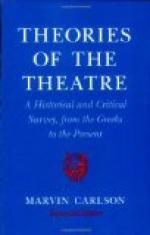For example, the career of one of the very best endowed theatrical composers of the nineteenth century, the late Victorien Sardou, has been molded and restricted for all time by the talents of a single star performer, Mme. Sarah Bernhardt. Under the influence of Eugene Scribe, Sardou began his career at the Theatre Francais with a wide range of well-made plays, varying in scope from the social satire of Nos Intimes and the farcical intrigue of Les Pattes de Mouche (known to us in English as The Scrap of Paper) to the tremendous historic panorama of Patrie. When Sarah Bernhardt left the Comedie Francaise, Sardou followed in her footsteps, and afterwards devoted most of his energy to preparing a series of melodramas to serve successively as vehicles for her. Now, Sarah Bernhardt is an actress of marked abilities, and limitations likewise marked. In sheer perfection of technique she surpasses all performers of her time. She is the acme of histrionic dexterity; all that she does upon the stage is, in sheer effectiveness, superb. But in her work she has no soul; she lacks the sensitive sweet lure of Duse, the serene and starlit poetry of Modjeska. Three things she does supremely well. She can be seductive, with a cooing voice; she can be vindictive, with a cawing voice; and, voiceless, she can die. Hence the formula of Sardou’s melodramas.
His heroines are almost always Sarah Bernhardts,—luring, tremendous, doomed to die. Fedora, Gismonda, La Tosca, Zoraya, are but a single woman who transmigrates from play to play. We find her in different countries and in different times; but she always lures and fascinates a man, storms against insuperable circumstance, coos and caws, and in the outcome dies. One of Sardou’s latest efforts, La Sorciere, presents the dry bones of the formula without the flesh and blood of life. Zoraya appears first shimmering in moonlight upon the hills of Spain,—dovelike in voice, serpentining in seductiveness. Next, she is allowed to hypnotise the audience while she is hypnotising the daughter of the governor. She is loved and she is lost. She curses the high tribunal of the Inquisition,—a dove no longer now. And she dies upon cathedral steps, to organ music. The Sorceress is but a lifeless piece of mechanism; and when it was performed in English by Mrs. Patrick Campbell, it failed to lure or to thrill. But Sarah Bernhardt, because as an actress she is Zoraya, contrived to lift it into life. Justly we may say that, in a certain sense, this is Sarah Bernhardt’s drama instead of Victorien Sardou’s. With her, it is a play; without her, it is nothing but a formula. The young author of Patrie promised better things than this. Had he chosen, he might have climbed to nobler heights. But he chose instead to write, year after year, a vehicle for the Muse of Melodrama, and sold his laurel crown for gate-receipts.




